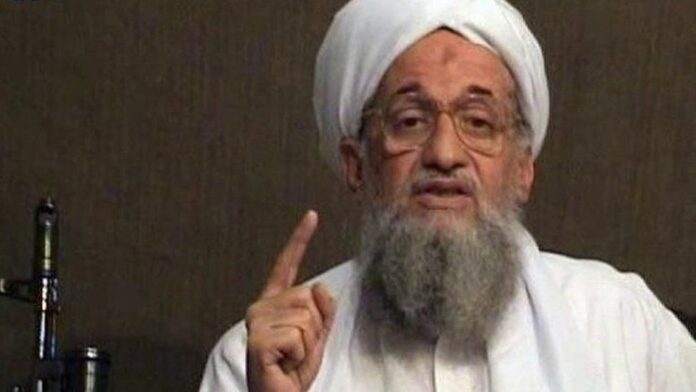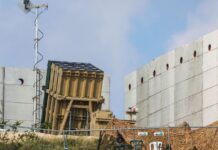On 02 August 2022, United States (US)’ President Joe Biden made a public announcement about a successful counter-terrorism operation carried out by the US forces in Kabul, Afghanistan. On 30 July 2022, on command of US President Biden, the Central Intelligence Agency (CIA) carried out a drone strike and eliminated the Emir or leader of al-Qa’ida in Sherpur, Kabul, Afghanistan. A similar counter-terrorism operation took place almost 11 years ago in Abottabad, Pakistan, where the then-leader of al-Qa’ida—Osama Bin Laden, was eliminated by the US Special Forces.
By Anurag Sharma
Reportedly, Ayman al-Zawahiri was based in the Kabul house of Taliban Interior Minister Sirajuddin Haqqani. Along with al-Zawahiri, Maulvi Zainuddin Aber, the Head of the office of the Taliban Interior Minister, was also killed. The write-up will briefly discuss the counter-terrorism operation carried out to eliminate Ayman al-Zawahiri, and also highlight some of the points which may lead to several unanswered questions related to the death of al-Zawahiri.
The Operation
According to reports, in April 2022, the US intelligence community briefed the US President over al-Qa’ida leader Ayman al-Zawahiri’s presence in a safe house in Kabul, Afghanistan. An on-ground intelligence source discovered that the safe house was in a residential neighbourhood, which was challenging. After months of observations, on 01 July 2022, the US President gathered and discussed the possibilities with the key national security officials in the White House Situation Room.
According to a US official (based on anonymity), on 30 July 2022, “a precise tailored airstrike” using two Hellfire missiles was carried out at 09:48 p.m. (around 06:20 a.m. Kabul time). The US official also confirmed that no prior notification or alert was shared with Taliban officials before the strike and that no American personnel were on the ground in Kabul.
If al-Zawahiri was “Traded”?
The United States (US) armed forces and intelligence fraternity have sophisticated resources and capabilities to carry out counter-terrorism operations worldwide. As per the reports, when al-Zawahiri relocated to downtown Kabul to reunite with members of his immediate family earlier this year, the US intelligence community tracked his whereabouts. The counter-terrorism operation was the culmination of months of “top-secret” planning by the US President, his close senior advisors, and the US intelligence community.Also, the role of solid ground intelligence cannot be neglected, which aided in the well-coordinated operation.
The killing of al-Zawahiri raised questions, including his presence in Kabul, Afghanistan, post-Taliban’s takeover of Kabul in mid-August 2021. The event of al-Zawahiri’s killing is quite similar tothe event that took place in Pakistan 11 years ago. On May 2, 2011, the US military’s Special Operations unit conducted a counter-terrorism operation that eliminated Osama Bin Laden at a “safe house” in Abbottabad, Pakistan. Nevertheless, to date, Pakistan’s establishment— Army and political reject the accusation of them knowing about Osama Bin Laden’s presence in the country; despite Osama’s safe house being around 05 kilometres (03 miles) South-West of the Pakistan Military Academy and around 110 kilometres (68 miles) away from Islamabad, the capital city of Pakistan.
Suspected Role of Pakistan
The substantial nexus between the Taliban, including other jihadist groups, and the Pakistan establishment, including Inter-Service Intelligence (ISI) Directorate, is well established. Despite hidden risks in the nexus, Pakistan continues to support the Taliban as a part of its policy of countering the Tehreek-e-Taliban Pakistan (TTP) for several years. Having the Taliban back in the powergame in Afghanistan is supposed to be the most favourable situation for Pakistan. In an interview with PBS Newshour in July 2021 (almost a month prior to the Taliban’s takeover of Kabul), former Pakistan PM Imran Khan accused the US of “messing up Afghanistan” and supported the Taliban by labelling them as “civilians” and not a “military outfit.” After the Taliban’s takeover of Kabul on 15 August 2021, Pakistan’s then-Prime Minister (PM) Imran Khan said that the “Taliban have broken ‘shackles of slavery.’”
Before the Taliban’s takeover of Kabul, Pakistan’s political and military establishments supported and provided shelter to the Taliban leaders and their other members, including providing medical facilities in military medical centres in Pakistan. In a paper titled The Sun in the Sky: The relationship between Pakistan’s ISI and Afghan insurgents, Matt Waldman highlighted several accounts of Taliban and Haqqani Network (HQN) groups where Pakistan’s ISI Directorate orchestrated, sustained, and strongly influenced the insurgency in Afghanistan. In addition to providing refuge to members of the Taliban and the Haqqani Network, Pakistan’s ISI Directorate has provided enormous support in finance, ammunition, training, and supplies.
Coming back to the episode of the killing of al-Zawahiri, several news reports are linking the killing of al-Zawahiri and the meeting between the US Deputy Secretary of State— Wendy Sherman & Pakistan’s Chief of Army Staff (COAS)— General Qamar Javed Bajwa, regarding Pakistan’s deteriorating economy and seeking help from the US to pressure the International Monetary Fund (IMF) for an early release of a crucial USD 1.7 billion monetary fund for Pakistan. As of now, these news reports are merely based on assumptions and without any substantial evidence. It is evident that the US Central Intelligence Agency (CIA) and Pakistan’s Inter-Services Intelligence (ISI) Directorate have strong intelligence and information-sharing relationships; therefore, the possibility of such cooperation cannot be ruled out in the killing of al-Zawahiri. The “reality” for assumptions may not appear on the surface so soon, but intelligence cooperation between the CIA and ISI Directorate may have raised suspicion about Pakistan’s involvement in the killing of Ayman al-Zawahiri.
Suspected Role of Taliban
As far as the Taliban’s ideologue and nexus with al-Qa’ida is concerned, they [Taliban] had provided complete protection to al-Qa’ida members post-September 11 attacks on the US. Despite the threat of the US military, the Taliban were in power and gave shelter to slain leaders of the al-Qa’ida group— Osama Bin Laden and Ayman al-Zawahiri and did not offer the duo and other al-Qa’ida terrorists to the US. In an interview, Wahid Omar— former advisor to the former Afghanistan President Ashraf Ghani Ahmadzai, confirmed the “relationship between the Taliban and al-Qa’ida is strengthening over time, and both terrorist groups are jointly attacking the government establishments in the country.” The United Nations Analytical Support and Sanctions Monitoring Team (UN-ASSMT) warned about the “deep-rooted connection” between al-Qa’ida and the Taliban in a report released on 01 June 2021. According to the report, al-Qa’ida and the Taliban members met in 2019 and early 2020 to discuss operational planning, training, and the provision of a haven for al-Qa’ida terrorists inside Afghanistan.
Over the killing of Ayman al-Zawahiri, the Taliban accused the US of violating the terms and conditions of the Doha Agreement, signed between the Taliban and the US under the leadership of former US President Donald Trump in 2020. However, the Taliban must realise that by providing shelter to the al-Qa’ida leader Ayman al-Zawahiri, the Taliban violated the terms of the Doha Agreement. In a press statement released by the US Department of State over the killing of Ayman al-Zawahiri, the US Secretary of State— Anthony J. Blinken said that “by hosting and sheltering the leader of al Qa’ida in Kabul, the Taliban grossly violated the Doha Agreement and repeated assurances to the world that they would not allow Afghan territory to be used by terrorists to threaten the security of other countries. They [Taliban] also betrayed the Afghan people and their stated desire for recognition from and normalization with the international community.”
Why would the Taliban give up on Ayman al-Zawahiri? Earlier, when the US post-9/11 attacks ousted the Taliban and possibilities of democracy under the US presence in Afghanistan forced the Taliban to maintain relations with al-Qa’ida, even after the killing of Osama Bin Laden. However, as the scenarios change over time, people change according to those scenarios. With the successful execution of the Doha Agreement with the US, followed by the US forces withdrawal from Afghanistan, the Taliban are back in power with “Taliban 2.0”. As of now, the Taliban do not have international recognition of their rule as a legitimate government; therefore, there is an assumption that to gain recognition and international support, the Taliban shared the whereabouts of slain al-Qa’ida leader Ayman al-Zawahiri, and the US took the opportunity to eliminate him.
The Killing of al-Zawahiri: Implications for India
Despite the second largest Muslim population and the presence of radical ideology, al-Qa’ida failed to make deep footprints in India; however, the terror group has consistently threatened India on several occasions. According to a Delhi Police official, based on anonymity, only 18 Indians joined al-Qa’ida between 2012 and 2015. In one of his articles titled “Terrorism Studies (National): Review of 2021 and Projections for 2022, the author stated that in 2021, law enforcement officials arrested 05 members of al-Qa’ida and its affiliated group— Ansar Ghazwat ul-Hind (AGuH), in comparison to 16 members arrested in 2020 across India.
On 10 February 2021, India addressed the United Nations Security Council (UNSC) briefing on the 12th report of the Secretary-General, emphasising Pakistan’s links to al-Qa’ida, the Islamic State, and other terrorist groups, as well as the threat these terror groups pose to international peace and security. In his address, India’s envoy to the United Nations (UN)— Ambassador T S Tirumurti, added that “We must not lose sight of the ease with which proscribed Haqqani Network (HQN) and its supporters, especially the Pakistani authorities, have worked along with prominent terrorist organisations such as al-Qaeda, ISIL, Tehrik-e-Taliban Pakistan (TTP), and other terror groups in South Asia.”
Ayman al-Zawahiri’s first statement regarding India was in 2019, after five years of forming AQIS. In a statement released in 2019, al-Zawahiri appeared in a video urging AQIS members to carry out attacks on the Indian Army and government officials in the Valley to “bleed” the economy and make the country “suffer.” The recent remarks of al-Zawahiri regarding India were on 08 June 2022, over the controversy regarding remarks on prophet Mohammad, the al-Qa’ida in Indian Subcontinent (AQIS) released a statement in which the group called to “re-build” al-Qa’ida’s machinery and carryout coordinated terrorist attacks in Delhi, Mumbai, Uttar Pradesh, and Gujarat.Although al-Qa’ida/AQIS failed to carry out any significant terrorist attack in India, its sympathisers or sleeper cells in the country will continue to challenge the Indian intelligence fraternity.
Al-Qa’ida After al-Zawahiri
The pro-al-Qa’ida channels on online platforms have mainly accepted the US announcement of the killing of the group’s leader— Ayman al-Zawahiri, in a Kabul drone strike on 30 July 2022, and showered praises and poetry— referring to him as a “martyr”, Al-Qa’ida did not make any official statement on the subject. At the time of this write-up, no official statement was issued by al-Qa’ida regarding the successor of al-Zawahiri; however, Sayf al-Adl, al-Zawahiri’s publicly-known deputy and living in Iran at present, is likely to become the new leader of al-Qa’ida.
Without efficient leadership, some al-Qa’ida members may opt for Islamic State (IS) as another option. However, according to al-Qa’ida expert Ali Soufan, “Sayf al-Adl is known for his experience and potential of his charisma to draw back al-Qa’ida defectors who have moved to other groups”. Though the Taliban have condemned the drone strikes in Kabul, which killed the leader of al-Qa’ida, it will be difficult for the Taliban to explain al-Zawahiri’s presence in Afghanistan to the international community. Also, the Taliban would be answerable to al-Qa’ida and other Islamic jihadi groups over the suspicion of its hand in the operation.
This article first appeared in www.vifindia.org and it belongs to them.








